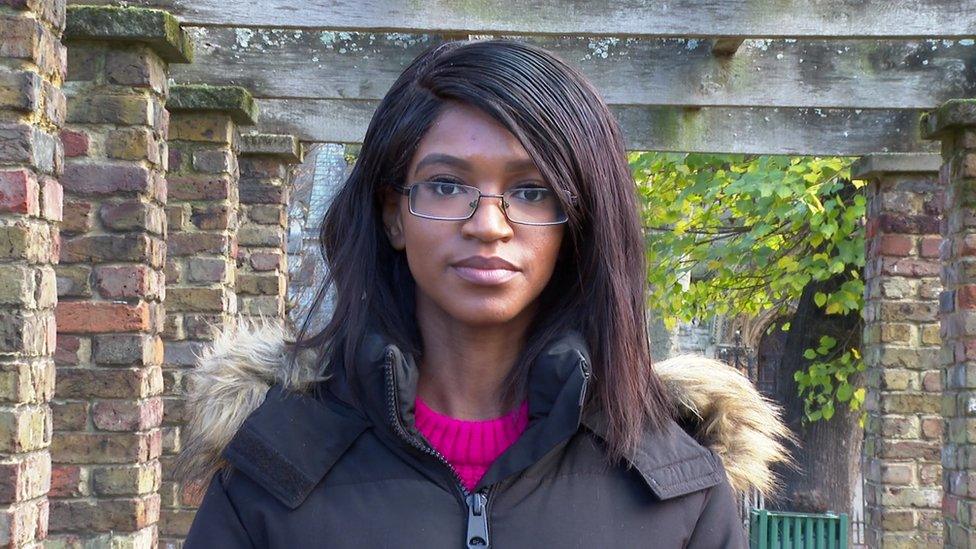Coronavirus: Ministers urged to extend universal credit 'boost'
- Published

Simone is one of hundreds of thousands struggling to find work during the pandemic
A Ā£20 a week uplift to universal credit has helped keep 700,000 people out of poverty during the pandemic and should remain in place beyond March, says a right-leaning think tank.
Nearly 700,000 more people have fallen into poverty but there would be twice this number without the extra Ā£20, says the Legatum Institute.
People who have lost jobs and have high housing costs are worst hit, it adds.
The government confirmed the uplift will be secure until March.
Universal credit claimants were given a Ā£20-a-week boost in response to the coronavirus pandemic in April, but this is due to end by next April.
Campaigners have raised concerns that the chancellor did not commit to extend the extra payment in last week's spending review.
Legatum's warning is the latest to the government on the need for continued support for families and individuals caught up in the economic fallout from the pandemic.
Last month the government's former homelessness adviser warned of a "period of destitution"
And the OECD said the pandemic risked worsening child poverty and inequality in the UK
'Some days are really, really difficult'
For single mum Simone, the outlook is "terrifying".
She gave up her job as a sales supervisor in a clothes shop at the end of last year, hoping for a better-paid role in customer relations.
But since the lockdown began in March, finding a job has proved impossible.
"I'm very worried because there's a lot of uncertainty, especially on benefits... some days are really, really difficult," she says.
"Food has been difficult. Occasionally it has picked up a little bit. I have been able to do a little bit more of a weekly shop, but it is difficult making sure the money lasts for the whole month... and there are no luxuries."
The idea of being unable to buy clothes and other essentials for her seven-year-old daughter is a major point of stress.
The pair live with Simone's mum but, as a care worker, she herself is on a low income, so they are still stretched financially - and then there's the issue of space, with three people in a two-bedroom flat.
"You're basically living on top of each other. We manage. We're grateful to have a roof over our heads but it is difficult... especially during lockdown when you're cramped indoors."
'A time of crisis'
Legatum says before the pandemic about 14.4 million people were estimated to be in poverty in the UK, according to a measure that looks at both income and unavoidable living costs, such as housing.
But its analysis suggests that during the pandemic another 690,000 were left struggling to pay bills and put food on the table.
It says younger and older workers with high housing costs have been hardest hit, as well as people with disabilities.
However, Legatum calculates that another 700,000 people have been kept out of poverty by the extra Ā£20 a week, and fears many would be unable to cope if it was stopped.
"Our analysis shows that, at a time of crisis, government action can protect many of those who are vulnerable to poverty," said Legatum chief executive Baroness Philippa Stroud.
She told the “óĻó“«Ć½ she wants to see the uplift continue beyond March because "it takes a while to get yourself up and out and back into work".
Sectors like hospitality where 81% have been furloughed or made redundant, could take a while to recover, she said, arguing that the Ā£20 should remain long enough "to see people through that process and to a place where they can work themselves out of poverty the other side".
Labour's shadow work and pensions secretary, Jonathan Reynolds, urged the government "to see sense" as removing the uplift would mean "taking Ā£1,000 a year from Britain's families at the peak of the unemployment crisis".
"This crisis has highlighted how important it is that we support each other but the Conservatives expect the poorest households to shoulder the burden," said Mr Reynolds.
A government spokesperson said: "We are wholly committed to supporting people on lower incomes and have paid out more than Ā£100bn in welfare support this year.
"The Ā£20 increase to universal credit continues to be in place until the end of March 2021."